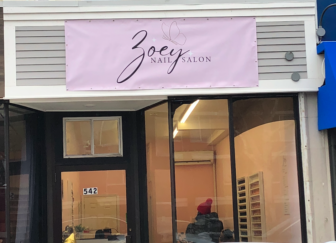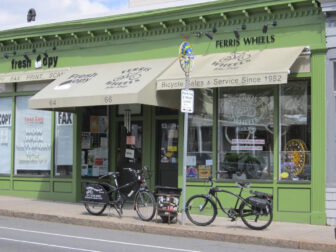Last updated on December 14, 2020
Patrick Lombard, a mechanic and owner of West Cork Auto on Centre Street, can get all the information he needs to diagnose car problems by plugging an expensive computer into a standardized port located under a car’s dashboard. In the future he may be using an app instead.

“Telematics is definitely becoming more and more common,” says Lombard, referring to electronic data that is collected and sent wirelessly from vehicles to automakers.
Telematics was at the heart of Massachusetts ballot Question 1, which passed by an overwhelming majority on Nov. 3. Previously, independent shops like West Cork Auto had no access to telematic data, which bypasses the under-dashboard port on its way to manufacturers’ servers.
Now that Question 1 is law, automakers will have to open telematics to car owners and independent repair shops via a standardized platform; independent repair shops will be able to purchase the ability to retrieve telematic data on an app.
Lombard explained that, for the time being, Question 1 will have little impact on West Cork Auto. He can still diagnose issues on the majority of cars by plugging-in his trusty computer, rendering telematics not yet useful enough to justify what he predicts will be a hefty price tag for access.
However, Lombard knows those dynamics will shift, and quickly.
“This business is changing so rapidly, because computers are taking over cars,” Lombard says. “I think the biggest profits in the future will come from electronics and telematics… the option is there, and if we decide to get into it, we can.”

While local auto repair shops see the passage of the measure as helping to secure their future, some computer experts warn that further action is needed to secure cars against hackers.
Adam Frost repairs computers in Jamaica Plain and heads the Boston Network Users Group, a monthly meetup of local computer enthusiasts. Curious about Question 1, Frost organized a virtual discussion in October; he invited not only lobbyists from the two organizations pushing a yes or no vote but also cyber-security experts unaffiliated with either camp.
Over the course of a two-hour long discussion the independent experts gave a more nuanced picture of the risks involved in a ‘yes’ vote. Assaf Harel, a former Israeli intelligence officer and chief computer scientist at Karamba security, agreed with the principle of allowing independent mechanics access to telematics, but warned that forcing automakers to open the data to such a wide array of individuals in a standardized format will increase a cars’ exposure to hackers.
“This is a pure and great idea, and I support it from the bottom of my heart, but in reality it’s impossible… you just granted access to every hacking group into your car,” said Harel.
For Frost, the risk to driver safety was too great. Modern vehicles have their essential mechanical functions, such as the brakes, tied to computers; if those computers are exposed to hackers then Frost believes drivers’ lives are at risk. After the National Highway Traffic and Safety Administration echoed these concerns in testimony to the Massachusetts legislature, Frost resolved to vote ‘no’ on the measure. The tech magazine Wired noted his objections in a feature article prior to the vote.
Now that the measure has passed, Frost wants legislators to act to ensure driver safety and the privacy of data.
Without continued civic engagement on the issue Frost is concerned where a “democracy on autopilot” will lead.
“When you automate something, you lose control over it, and it comes back to bite you,” he says.




